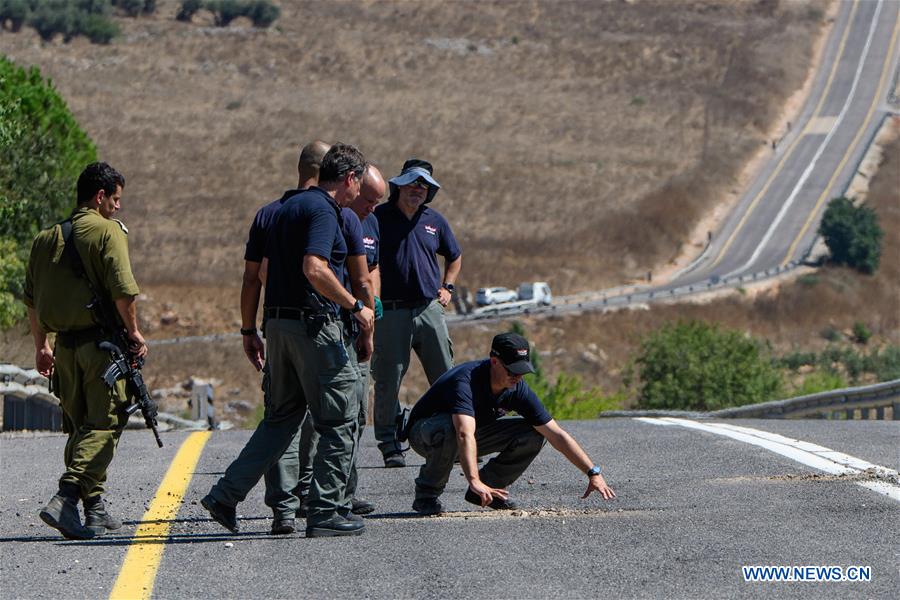The dangers posed by Israeli attacks on three neighbors
- By Jin Liangxiang
 0 Comment(s)
0 Comment(s) Print
Print E-mail China.org.cn, September 3, 2019
E-mail China.org.cn, September 3, 2019

Israel has been attacking certain facilities of three of its neighbors–Syria, Lebanon and Iraq–mainly with drones since August 24, again drawing the attention of major international media to the precarious regional situation.
It is true that Israel's actions were in line with previous security policy and practice, but they also do reflect fresh concerns about some of the crucial changes of Middle East politics.
It has become common practice in the Middle East for a country to launch cross-border attacks against another in total disrespect of its sovereignty. Israel very frequently crosses borders as casually as walking at home to bomb and seek to destroy targets in its neighbors.
Not only are such actions destroying the widely-held concept of national sovereignty, but they are also feeding the fires of regional instability.
However, Israel's operations this time, targeting facilities in the three countries named pro-Iran forces differ from what it has carried out previously. This is the first time it has conducted simultaneous operations against so many targets in recent years.
It is the first military action against Hezbollah since 2006 when the two became locked in military clashes for months on end. It is the first time Israel has conducted a military operation within Iraq since bombing the country's nuclear facilities in 1981.

These military operations, though not large, reflect Israeli concerns about the changing regional geopolitical picture. And, it is certainly true that concern about the threat from Iran is not unfounded.
However, for a rather long time, despite being hostile to each other, Israel and Iran, have only been shouting at each other across a broad swathe of intervening countries (although Hezbollah, as an affiliate of Iran, operates close by).
Today's situation is quite different. Besides having Hezbollah based in Lebanon, Iran had already stationed troops in Syria supporting that country's government, directly threatening Israel on the other side of the Golan Heights, and there are also various pro-Iran Shiite militias in Iraq.
Thus Israel is facing pro-Iran forces in its immediate neighborhood posing threats from three directions. That is why Israel has been feeling extremely uncomfortable in the last decade. How to diminish Iranian influence, therefore, has become Israel's main regional strategic purpose and the recent military strikes are a result of that.
Israel's bombing at this particular moment also reflects Benjamin Netanyahu's efforts to focus on security topics to win votes in the election due to be held on September 17. He has already served more terms than any other prime minister since the founding of modern Israeli state.
In order to stay in power, he has chosen to raise and even exaggerate the supposed external threat. At the same time, taking strong military actions against the targets defined by himself, is designed to show he is the right person to protect the Israeli people. And, it's obvious that this line is selling well within his constituency.
There might be more profound considerations behind Israel's latest bombing raids. Israel, for a rather long time, has been relying on the United States to take care of its security concerns enabling it to stay aloof.

For instance, in Syria's case, Israel chose to stay away from the crisis there between 2011 and 2017, while working hard to push the U.S. to intervene militarily in the declining security situation. However, it has become concerned by signs that neither Barack Obama nor Donald Trump seemed to interested in investing more American military resources in Syria.
In addition, despite his tough talk on Iran, President Trump refrained from bombing Iranian targets when an American drone was downed by Iran.
That is the reason why Israel has finally been moving to the military frontline itself. In late 2017, it began targeting Iranian facilities in Syria, and this time it has chosen to bomb pro-Iran forces on a wider territorial range.
Such operations may be expected to expand in future based on its perception of Iran's growing threat through use of proxies and without significant American military involvement. That is the really dangerous scenario the Middle East will have to face in the future.
If this is the new normal of Israeli attacking Iran's proxies in its neighborhood, then the latter will have no choice but to retaliate against Israeli targets, and Hezbollah in particular won't hesitate to do so.
Though we do not know to what extent the tensions will escalate into, the exchange of firing might become inevitable. The situation might also persuade the U.S. to become more deeply involved in the region and in efforts to target Iran.
Dr. Jin Liangxiang is Senior Research Fellow with the Center for West Asian and African Studies, Shanghai Institutes for International Studies. For more information please visit:
http://www.china.org.cn/opinion/jinliangxiang.htm
Opinion articles reflect the views of their authors, not necessarily those of China.org.cn.
If you would like to contribute, please contact us at opinion@china.org.cn.






Go to Forum >>0 Comment(s)